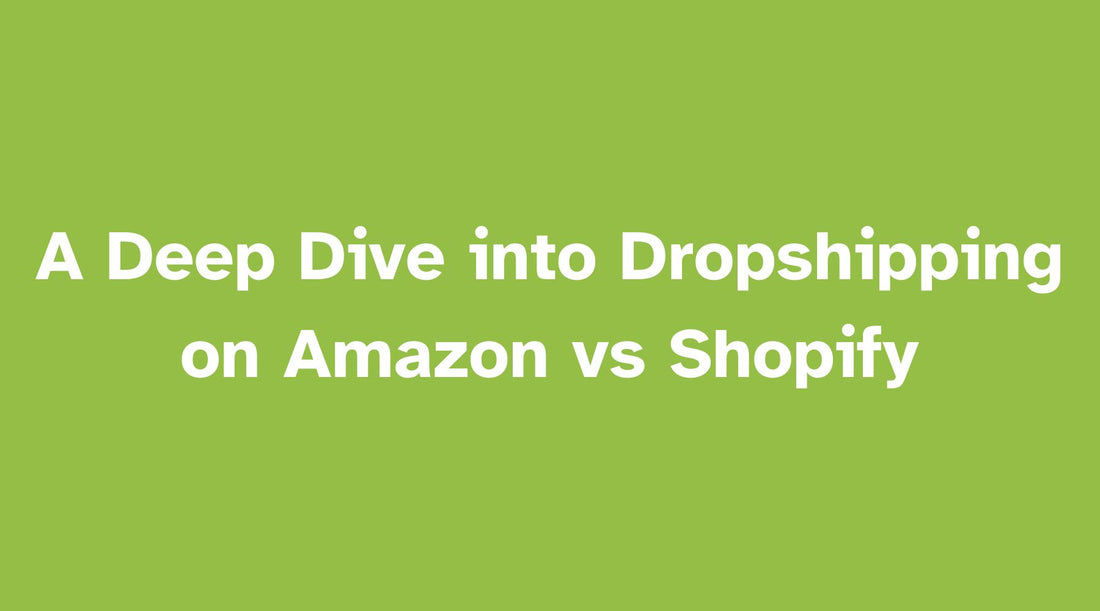When it comes to venturing into the world of online retail in South Africa, choosing the right platform for dropshipping can make all the difference. Two giants in the e-commerce realm, Amazon and Shopify, offer distinct advantages and considerations for aspiring entrepreneurs. Let's dive into the comparison to help you make an informed decision for your online store at DiscountDealz.
Amazon's Fulfilled by Amazon (FBA) vs Shopify's Third-Party Suppliers
Amazon opens its doors to dropshipping through the Fulfilled by Amazon (FBA) program, a service where the retail giant takes charge of packaging and shipping your products. This hands-off approach may seem enticing, but it comes at a cost. Amazon slices off approximately 15% of your top-line revenue, leaving you with a slimmer profit margin of around 15% for each product sold.
"Amazon's FBA offers convenience, but it comes with a price – literally. Be prepared for a chunk of your revenue to find its way into Amazon's pocket."
On the other hand, Shopify takes a different route, allowing dropshipping through third-party suppliers. This model puts you in the driver's seat when it comes to managing inventory and order fulfillment. Shopify also equips you with a suite of tools covering everything from fulfillment to sourcing, pricing, and marketing.
Profit Margins, Fees, and the Fulfillment Balancing Act
As an online entrepreneur, your profit margins are a crucial consideration. Amazon's hefty fee structure may eat into your profits, making it essential to carefully weigh the convenience of FBA against its impact on your bottom line. Shopify, with its third-party supplier model, provides a more flexible fee structure, offering you greater control over your profit margins.
"Shopify puts the reins in your hands, allowing you to steer your profit margins with a bit more freedom. The key is finding the right balance between convenience and financial gains."
Amazon's Dropshipping Rules vs Shopify's Flexibility
Navigating the world of dropshipping isn't a walk in the park, especially when it comes to adhering to platform policies. Amazon has specific rules that sellers must follow to stay compliant. These rules include restrictions on using Prime shipping for dropshipped products and ensuring that you have adequate control over order processing and customer service.
In contrast, Shopify offers more flexibility, enabling you to craft your own policies and procedures for dropshipping. This can be a game-changer for those who value autonomy and want to tailor their business processes to suit their unique needs.
Making the Right Choice for Your South African Venture
In the bustling e-commerce landscape of South Africa, the choice between dropshipping on Amazon and Shopify hinges on various factors. Your business model, profit goals, and preferences for inventory management and order fulfillment should guide your decision-making process.
"South African entrepreneurs, it's not just about choosing a platform; it's about choosing a path that aligns with your business vision and goals."
Is Dropshipping Allowed on Amazon?
Yes, dropshipping is allowed on Amazon through the Fulfilled by Amazon (FBA) program. However, sellers need to adhere to specific rules, such as not using Prime shipping for dropshipped products and maintaining control over order processing and customer service.
What Fees Does Amazon Charge for Dropshipping?
Amazon charges approximately 15% of the top-line revenue for products sold through the Fulfilled by Amazon (FBA) program. This fee includes handling packaging and shipping but can significantly impact the profit margin for each item.
How Does Shopify Facilitate Dropshipping?
Shopify facilitates dropshipping through third-party suppliers, allowing entrepreneurs to manage inventory and order fulfillment without dealing with packaging and shipping. The platform provides a range of tools for sourcing, pricing, and marketing.
What Control Do I Have Over Profit Margins on Amazon?
While dropshipping on Amazon through Fulfilled by Amazon (FBA) offers convenience, sellers have limited control over profit margins due to the platform's fixed fee structure. It's crucial to factor in these fees when pricing products.
Can I Set My Own Policies for Dropshipping on Shopify?
Yes, Shopify provides flexibility, allowing entrepreneurs to set their own policies and procedures for dropshipping. This autonomy is beneficial for tailoring business processes to align with unique needs and preferences.
What Rules Should I Follow for Dropshipping on Amazon?
Amazon has specific rules for dropshipping, including restrictions on using Prime shipping for dropshipped products. Sellers must also ensure they have adequate control over order processing and customer service to stay compliant with Amazon's policies.
Is Shopify More Cost-Effective Than Amazon for Dropshipping?
Shopify's fee structure tends to be more flexible than Amazon's, offering entrepreneurs greater control over their profit margins. However, the overall cost-effectiveness depends on individual business strategies, sales volume, and other factors.
Can I Use Prime Shipping for Dropshipped Products on Amazon?
Amazon has restrictions on using Prime shipping for dropshipped products. Sellers need to carefully navigate this policy and consider alternative fulfillment options provided by Amazon to stay in compliance.
Which Platform Offers More Autonomy in Business Operations?
Shopify provides more autonomy in business operations compared to Amazon. Entrepreneurs can craft their own policies, procedures, and strategies for dropshipping, allowing for a more customized and unique approach to their online business.
What Considerations Are Specific to Dropshipping in South Africa?
For South African entrepreneurs, factors such as local market dynamics, shipping logistics, and payment gateways are crucial considerations. Understanding the unique aspects of the South African market is essential for success in dropshipping
Related Articles:
- Amazon vs Competitors
- Selling on Amazon vs Dropshipping
- Amazon vs Takealot
- Amazon vs Shein
- Amazon vs Other Retailers
Conclusion
In conclusion, both Amazon and Shopify offer distinct advantages and considerations for dropshipping in South Africa. As you embark on your e-commerce journey with DiscountDealz, carefully weigh the pros and cons of each platform to ensure that your business thrives in the competitive online marketplace.

